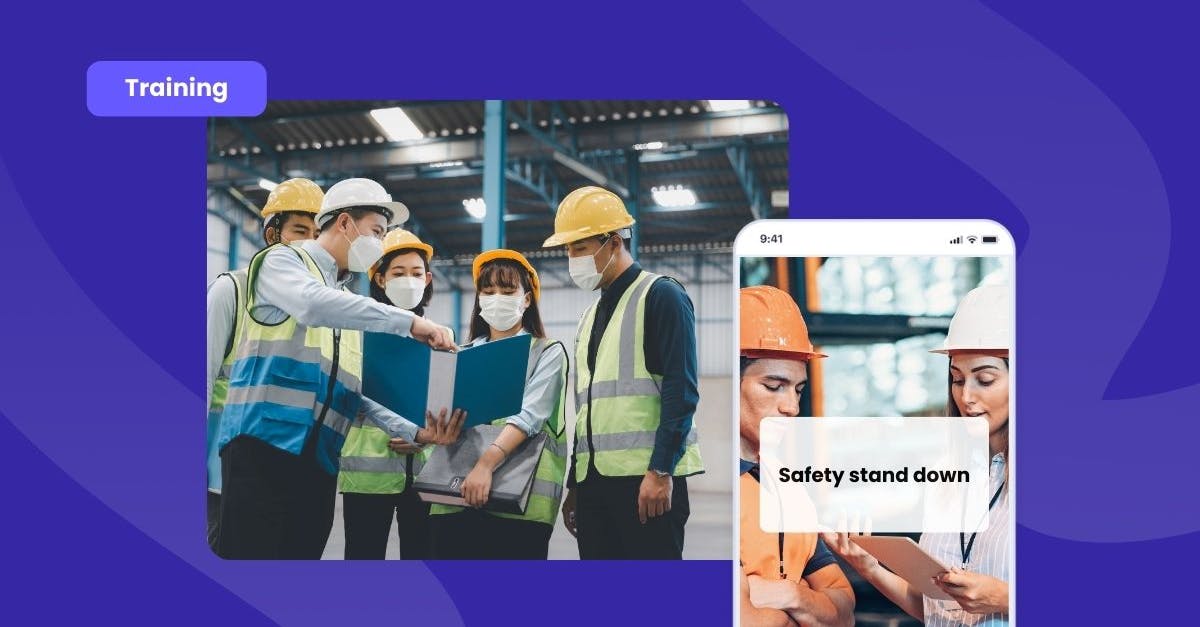What is a safety stand-down? A guide
In the construction industry, your wins are measured by your team’s efficiency and the quality of their work. Deadlines and productivity levels can easily overshadow safety in this field. At some point, companies need to sit back and refocus on what truly matters: the well-being of their team.
Whether it’s prompted by a recent incident, a seasonal risk, or just a commitment to continuous improvement, a safety stand-down puts safety front and center, even in the busiest environments.
What is a safety stand-down?
A safety stand-down is a voluntary event where employers get to talk to their team about safety. It involves taking a break from work to discuss different safety hazards, go through training, or refresh their knowledge on safety procedures.
Why are safety stand-downs important?
Amidst the daily routines and busy shifts, it becomes easy to push hazard awareness to the background. If you’re interested in organizing a safety stand-down and want to get everyone on board, it’s important to know how it benefits the team.
Prevent hazards
Safety stand-downs give your team a deliberate pause from all the noise, allowing them to have honest conversations about safety. It teaches them to stay proactive during a disaster by focusing on prevention rather than reaction.
Discussions in safety stand-downs help your crew identify hazards and develop ways to address them. Doing this trains them to be more attentive to potential risks that would otherwise be overlooked in their day-to-day.
Reduce costs
By staying ahead of the game, your team can stay safe from accidents and fatal injuries. An accident-free workplace avoids facing expensive lawsuits. It also means lower treatment costs, compensation claims, and insurance premiums for your department.
But it’s not just about cutting down the financial losses. When a company makes safety a top priority, they can minimize downtime and hit their targets consistently. This gives your team zero project delays to worry about.
Reinforce safety importance
Regular stand-downs signal that the company highly values safety. When employees see that safety is deeply rooted in the company culture, it gives them a sense of responsibility to continue upholding its values. This helps them build the habit of prioritizing safety as they accomplish their tasks every day.
Enhance compliance
During a safety stand-down, employees can recall current regulations on several safety topics. This keeps them up to speed on the dos and don’ts, avoiding penalties and other legal headaches.
Stand-down attendance logs and certificates of participation can also serve as proof of due diligence during OSHA inspections. It’s a great way to show that your company keeps employee safety at the top of their minds.
Upskill your team
When your team is working in a high-risk industry where hazards are part of the job, the variable you can control is preparedness. Safety stand-downs allow you to teach your team what to do in the event of an accident.
On another note, accidents happen outside of work, too. Knowing how to respond to an emergency is an upskilling opportunity they can use at home and in public areas. This way, your team can promote safety awareness outside the workplace as well.
OSHA’s National Safety Stand-Down on Fall Prevention
A widely recognized safety stand-down example is the Occupational Safety and Health Administration (OSHA)’s national safety stand-down on fall prevention. Through this event, employers in the construction industry can conduct OSHA toolbox talks on fall hazards and fall prevention strategies.
Those interested in participating can visit the official site and check the upcoming OSHA safety stand-down events happening throughout the states. The page lists down important details on the earliest Stop Falls Stand Down events, including important contact information and registration instructions.
Popular safety stand-down topics to discuss
While OSHA’s national safety stand-down focuses on fall prevention, safety stand-downs can be done for other industrial safety topics as well. Here’s a list of some safety topics you can discuss with your team.
1. Fire safety
Construction workers are exposed to various fire hazards at work, constantly putting their lives at risk. A 2022 report by the National Fire Protection Association (NFPA) found that almost a dozen fires occurred in buildings under construction every day. Incidents like this highlight a growing need for fire safety awareness in the industry.
A safety stand-down on fire safety in the workplace is a good time to teach your team proactive measures and emergency responses. You can give tips to help them identify fire hazards in the job site, discuss the proper use of a fire extinguisher, or practice evacuation procedures.
2. Personal protective equipment (PPE)
Personal protective equipment are meant to protect your team from workplace hazards. But when used incorrectly, PPEs won’t really do the trick. During safety stand-downs, you can talk to your team about proper PPE usage, along with regular maintenance and inspections.
PPEs are also a form of compliance. Several regulations meant to encourage workplace safety involve the use of protective equipment during operations. Organizing a safety stand-down gives you the chance to keep your team updated on these regulations. It also reminds them that wearing PPEs isn’t optional, but mandatory.
3. Electrical safety
It’s not unusual to hear reports about an electrical disaster happening at construction sites. Faulty wiring, exposed electrical components, and overhead and underground power lines are all a common sight during construction. That’s why workers tend to overlook how much harm it can actually do.
Let your team know how an electrical hazard can lead to a disaster through safety stand-downs. Develop electrical safety protocols and review them with your team. Help them identify and get rid of threats like live wires and damaged equipment so they can keep everyone safe.
4. Handling hazardous materials (HAZMAT)
Teams working in construction are also exposed to different hazardous materials that put their life at risk. One known example is asbestos. Asbestos is widely used in construction because of its strength, heat resistance, and affordability. However, it’s also known to cause severe health risks like lung cancer when inhaled.
Have a stand-down meeting with your team to talk about hazardous materials like asbestos. This can help them recall how to properly label, store, or dispose of these harmful substances so everyone can continue with work safely.
5. Operating vehicles and equipment
Construction projects are completed much faster when construction vehicles do the heavy lifting. But while they can enhance productivity, using these tools comes with certain risks. This is why it’s also important to have safety stand-downs and talk about best practices when someone is operating these heavy-duty vehicles.
Stand-downs give old and new operators a chance to get hands-on training. Whether they’re still learning the ropes or looking for a quick refresher, it’s a great opportunity for your team to learn from each other.
Steps to host a successful safety stand-down
A successful safety stand-down requires a lot of planning, participation, and follow-ups. Here are some steps to organize a safety stand-down that can reduce workplace risks and foster a culture of safety within your team:
1. Set purpose and goals.
Decide why you’re holding the stand-down. Is it to address a recent incident, reinforce safety policies, or focus on a specific hazard? Define what you want to achieve so everyone understands the importance of the event. Setting the purpose of the stand-down also decides the core message your program will revolve around.
2. Plan and schedule the stand-down.
Pick a time that works for most employees and won’t disrupt critical operations. Make sure to allow enough time for meaningful discussion, but keep it efficient. Take care not to stray too far from the overall message you want your team to understand.
3. Prepare relevant topics and materials.
Choose safety topics that matter to your team. This could be recent near-misses, equipment checks, or company safety updates. Prepare visual aids, real examples, or hands-on activities to make the session engaging.
4. Invite important people and encourage participation.
Invite supervisors, safety officers, and even outside experts if needed. Involving people with more expertise will make the event more credible and significant. Encourage everyone to join in, ask questions, and share their experiences.
5. Execute the stand-down.
Create a welcoming and open environment. Present your topics clearly, use visuals or demonstrations, and keep the discussion interactive. Make sure everyone feels comfortable speaking up.
6. Gather feedback for future safety events.
Ask for feedback on what worked and what could be improved. Use what you learn to update safety procedures, plan future stand-downs, and keep safety conversations going year-round.
Create an effective safety stand-down program with SC Training’s safety courses
The secret to a productive safety stand-down lies in the topics you discuss and the lessons you teach. SC Training’s extensive course library packs plenty of courses about workplace safety. From fire emergencies to proper PPE usage, you’ll find valuable training materials to launch your stand-down program.
SC Training’s courses come with gamification elements to keep your stand-down fun and engaging. It features a built-in leaderboard system that keeps track of everyone’s points so you can give top scorers a little stand-down reward.
Author
Shan Jose
Shan Jose is a content specialist for SC Training, a learning management system that provides microlearning solutions for businesses and organizations. Her work offers SaaS solutions and practical advice to enhance workplace and compliance training, boosting training effectiveness and meeting essential requirements. Outside of work, she enjoys singing, playing story-driven video games, and spending time with friends and family.

